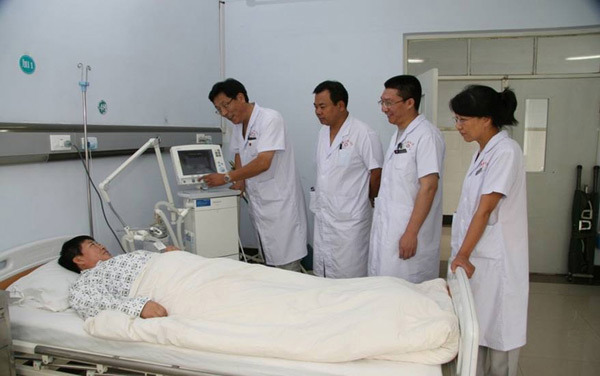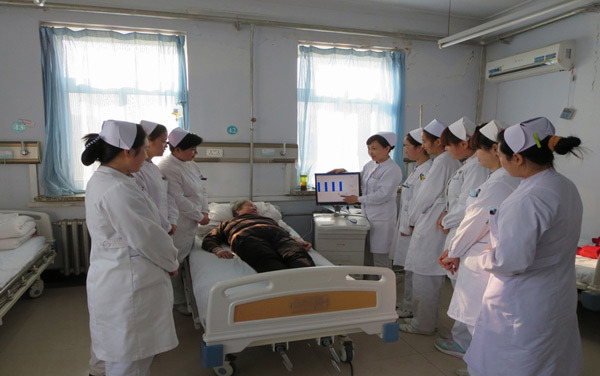Department Overview:
The Geriatrics Department was established in 2011 and currently has 33 medical staff, including 19 doctors (2 professors, 1 national-level expert, 1 provincial-level expert, 8 associate chief physicians, and 8 medical masters) and 14 nursing staff (including 1 nursing master). The department has 57 beds. In its relatively short history, under the leadership of Director Yang Wen as the academic leader, it has established a strict management system and a well-rounded medical, teaching, and research team. The ward provides comprehensive and specialized medical and nursing services with superior conditions and complete facilities. It is equipped with international and domestically advanced diagnostic, treatment, rehabilitation, and monitoring equipment, including ECG monitors, remote multi-parameter monitors, electrocardiogram machines, cardiac defibrillators, ventilators, arterial blood gas analyzers, central oxygen supply, negative pressure sputum suction devices, infusion pumps, injection pumps, dynamic glucose monitors, and the province’s first neuromuscular electrical stimulation therapy apparatus.
Department Features:
"Age" and "disease" are often closely linked. Due to the aging and functional decline of the body, elderly individuals rarely suffer from just one illness—multiple comorbidities are common. Surveys show that people over 60 typically have more than seven conditions. These diseases are often hidden, progress rapidly, change suddenly, and involve numerous complications. For example, a patient may simultaneously have diabetes, cerebral thrombosis, and hypertension, with various conditions interacting and compounding one another. Organ function declines, and diseases become chronic and complex. Under current medical specialization standards, such patients would need to be hospitalized in separate departments like endocrinology, neurology, and cardiology, which is highly inconvenient. The Geriatrics Department offers comprehensive diagnosis and treatment for multiple conditions, providing convenience for patients and reducing costs. The department consistently adheres to the principle of "Virtue First, Skill Paramount, Serving the People, Promoting Health" and actively advances disciplinary development. Its strict management and standardized operations have become a model within the hospital.
The department practices patient-centered holistic healthcare and nursing. Medical staff not only treat patients’ physical diseases but also address their psychological issues. Beyond treating diseases, the focus is on prevention—correcting unhealthy lifestyle habits and providing guidance and medication for psychological disorders. Medical staff actively and accurately explain conditions to patients, humbly listen to their opinions and suggestions, and promote common knowledge of elderly health maintenance to maintain both physical and mental well-being. For patients with repeated hospitalizations, follow-up cards are established to facilitate timely telephone consultations, monitor changes in conditions, and enable immediate admission for treatment when necessary.
Disciplinary Development:
Since its establishment, under the leadership of Professor Yang Wen, the Geriatrics Department has always adhered to a people-oriented approach, emphasizing the integration of personal development and disciplinary growth. The academic梯队 has grown healthily, and talents with specialized expertise have gradually emerged. In its relatively short history, research work has started from scratch and gradually achieved breakthroughs. Director Yang Wen also serves as the chairman of the Jilin Provincial Medical Association Geriatrics Branch. Most doctors in the department are versatile specialists, possessing comprehensive knowledge of geriatric internal medicine as well as expertise in specific areas such as cardiovascular, cerebrovascular, and endocrine diseases. With the support and care of the hospital leadership, the entire department strives for innovation and progress to achieve new accomplishments.
Under the leadership of Head Nurse Zhang Yu, the nursing team remains united and actively pursues professional knowledge in nursing. Regular business training and study sessions are organized for nursing staff, and all nurses are required to master the principles and operation of various advanced medical equipment to ensure closer collaboration with doctors and provide safer, more meticulous care for patients. Medical staff demonstrate exceptional patience and compassion toward elderly patients, earning recognition and praise from those they serve.
Scope of Diagnosis and Treatment in the Geriatrics Department:
Cardiovascular Diseases: Primarily include conditions related to the heart and blood vessels (arteries, veins, microvessels), often associated with atherosclerosis, such as coronary heart disease, hypertension, arrhythmias, and heart failure.
Cerebrovascular Diseases: A group of conditions caused by intracranial circulation disorders leading to brain tissue damage. Commonly referred to as "cerebrovascular accidents," "strokes," or "brain attacks," these diseases manifest as hemiplegia, speech impairments, etc. Rehabilitation treatments are also provided for patients with cerebral infarction and cerebral hemorrhage.
Respiratory Diseases: Mainly affect the trachea, bronchi, lungs, and thoracic cavity. Mild cases may involve coughing, chest pain, and impaired breathing, while severe cases can lead to dyspnea, hypoxia, and even respiratory failure. Due to factors such as air pollution, smoking, population aging, and cold weather in northern regions, the incidence is higher in autumn and winter. Conditions include chronic obstructive pulmonary disease, pulmonary heart disease, bronchial asthma, and diffuse interstitial lung fibrosis.
Digestive System Diseases: Involve organs such as the esophagus, stomach, intestines, liver, gallbladder, pancreas, peritoneum, mesentery, and omentum. Internal medicine treatments are provided for conditions including gastritis, gastric and duodenal ulcers, enteritis, cholecystitis, pancreatitis, and liver cirrhosis.
Metabolic Diseases: Conditions caused by metabolic issues, including metabolic disorders and hyperactivity. Common diseases include diabetes, hypoglycemia, gout, and osteoporosis.
Others: Diagnosis and treatment of conditions such as urinary tract infections, anemia, autoimmune diseases, and advanced cancer.

